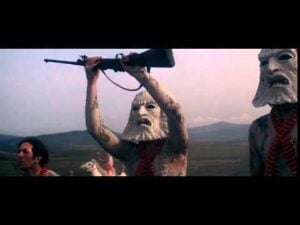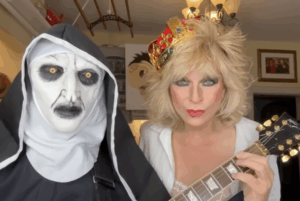Forgotten and Gone: ’70s Icons Who Died Under the Radar

via Shamara011061 / YouTube
The 1970s delivered an unforgettable era of cultural output, shaping everything from blockbuster cinema and genre-defining music to unforgettable television and legendary sports moments. It was a decade marked by innovation and experimentation, with artists and entertainers pushing boundaries that would influence generations to come. Yet, for all the fanfare and acclaim that era produced, time has a way of reshaping fame.
Many of the individuals who helped define that golden period eventually slipped out of the spotlight. Whether due to changing tastes, shorter career arcs, or quiet retirements, a number of once-prominent names gradually disappeared from public consciousness. As newer stars emerged, the cultural memory of some of the ’70s most impactful figures began to fade.
When the final chapters of their lives came, these icons passed without the fanfare their legacies deserved. Overshadowed by the noise of modern media or simply forgotten by a fast-moving world, their deaths came and went quietly. This article takes a moment to look back at those once-celebrated figures who helped shape a decade—only to leave it, and this world, with little notice.
Donna Summer Died Months Before Her Rock Hall Induction
Donna Summer wasn’t just a disco star — she was a musical force who crossed genres with grace and power. From the moment “Love to Love You Baby” hit the airwaves, Summer captivated listeners with her sultry voice and innovative sound. She helped shape the disco era, but even after the dance floor faded, she continued her chart presence with enduring pop hits well into the 1980s.
Her influence remained undeniable, but her passing didn’t quite receive the fanfare one might expect from such a transformative figure. Diagnosed with a rare, non-smoking-related form of lung cancer, Summer died on May 17, 2012, at the age of 63. Just seven months later, she was posthumously inducted into the Rock and Roll Hall of Fame — a bittersweet honor that came too late for her to experience firsthand.
Despite the magnitude of her career, news of her death barely caused a ripple in mainstream coverage. It was a quiet end for someone who once ruled the charts and clubs, a reminder of how even legends can be quietly forgotten when time moves on and genres change.
https://twitter.com/MoorInformation/status/1129257369853145088
Sherman Hemsley Passed Quietly Despite Redefining Sitcom History
Sherman Hemsley helped revolutionize television with his unforgettable portrayal of George Jefferson — a bold, brash, and groundbreaking character in an era when representation was still limited. With a delivery that was both hilarious and heartfelt, Hemsley brought George to life on All in the Family and later made him the centerpiece of The Jeffersons, one of the longest-running and most beloved sitcoms of the ’70s and early ’80s.
After The Jeffersons ended, Hemsley remained active, starring in Amen and lending his voice to animated projects. But despite his significant impact on TV history, his later years were largely spent out of the spotlight. When he passed away on July 24, 2012, at his home in El Paso, it was due to complications from lung cancer — a fact that surfaced only after a modest local announcement.
There were no major tributes or widespread retrospectives at the time. For someone who once dominated primetime and helped push sitcoms into new territory, Hemsley’s quiet exit stands in stark contrast to the noise he once created onscreen.
Eric Carmen’s Final Note Came With Little Media Sound
As the voice behind The Raspberries and a string of soft rock hits, Eric Carmen was a key figure in defining both power pop and emotional ballads of the ’70s. With hits like “Go All the Way” and “All By Myself,” Carmen combined vulnerability with musical precision, shaping a sound that bridged teen energy and adult introspection. His influence extended into the next decade with enduring tracks like “Hungry Eyes.”
Despite a multi-decade career, Carmen’s passing received only brief mentions in music circles. His wife announced his death via a post on his official website in March 2024, noting he had passed peacefully in his sleep the night before. No further details were released, and major outlets only lightly touched on the news.
Considering his chart success and cultural footprint, the subdued coverage felt disproportionate. Carmen may not have remained a household name, but his songs still echo across generations — even if his passing didn’t make headlines.
Meat Loaf’s Rock Opera Life Ended in Silence
Few artists could fill a stage the way Meat Loaf did. With his booming voice and theatrical presence, he turned albums like Bat Out of Hell into epic productions that transcended traditional rock. His dramatic style and partnership with songwriter Jim Steinman created anthems that became staples of late ’70s radio and jukeboxes everywhere.
Despite a brief resurgence in the ’90s and memorable film roles, including Fight Club, Meat Loaf’s health quietly declined in later years. He struggled with multiple chronic illnesses and was ultimately hospitalized in early 2022 with COVID-19. He passed away soon after, on January 20, at the age of 74 — a news item that, despite his legacy, barely broke through that day’s headlines.
It was a muted farewell for an artist who lived for spectacle and sound. For someone whose music once demanded attention, the quiet surrounding his death marked a jarring and melancholic contrast.
Erin Moran’s Death Reflected a Life of Struggle After Fame
Erin Moran charmed television audiences as Joanie Cunningham on Happy Days, evolving from a kid sister side character into a key figure on one of the biggest shows of the 1970s. Her chemistry with Scott Baio even launched a spinoff, Joanie Loves Chachi, and cemented her place in TV history. But as the sitcom era faded, so did the spotlight on Moran.
Her post-Happy Days years were marked by hardship. Financial instability, housing issues, and health struggles defined much of her adult life. After years of living in motels and dealing with evictions, Moran was diagnosed with squamous cell carcinoma. In 2017, she passed away at just 56 years old — a tragic early death, but one that flew mostly under the radar.
The subdued reaction to Moran’s passing reflected the sad truth of how quickly the entertainment world can move on. Her name may not trend anymore, but for anyone who grew up watching TV in the ’70s, Joanie will always be part of a more innocent time.
Ron Palillo’s Horshack Set the Nerdy TV Archetype Long Before Urkel
Before the awkward teen sidekick became a sitcom staple, Ron Palillo brought Arnold Horshack to life on Welcome Back, Kotter. With his distinctive laugh, eager hand-raising, and lovable weirdness, Horshack quickly became one of the standout “Sweathogs,” despite being a supporting character. Palillo’s performance helped shape what would become a recurring TV trope — the oddball nerd with a big heart.
Though Palillo continued to act after the show ended in 1979, his fame never quite returned to those heights. He found steady work as a voice actor in cartoons and pursued his passion for stage acting, often performing in regional theater. While his career remained active, it existed largely outside of the mainstream spotlight that had once embraced him.
On August 14, 2012, Palillo died of a heart attack at his home in Palm Beach Gardens, Florida. He was just 63 years old. Despite the significant cultural footprint of Welcome Back, Kotter, Palillo’s death barely made a ripple beyond local news and nostalgic fan forums.
Cindy Williams Starred in the Most-Watched Show of the Late ’70s
Cindy Williams launched her career with some serious star power, appearing in two major ’70s films: George Lucas’s American Graffiti and Francis Ford Coppola’s The Conversation. But it was her role as Shirley Feeney on Laverne & Shirley that made her a household name. The series became the most-watched show in the country during the 1977–78 season, thanks in part to Williams’s perfect comedic timing and everywoman charm.
After leaving Laverne & Shirley in 1982, Williams remained active in television, mostly taking roles in sitcoms and guest appearances. Though she stayed connected to the industry for decades, she never landed another part as iconic as Shirley. Still, her influence lingered in the reruns and hearts of fans who grew up watching her.
Williams passed away on January 25, 2023, after a short illness. She was 75. Despite her massive impact on ’70s TV, her death was treated with only mild coverage — a surprisingly quiet farewell for one-half of a duo that once ruled prime time.
Linda Lavin Was the Face of One of the ’70s Longest-Running Sitcoms
Linda Lavin’s big break came not in front of a camera, but on a Broadway stage. After building a solid theater résumé in the ’60s, she transitioned to television and eventually landed the lead role in Alice, a sitcom based on the Martin Scorsese film Alice Doesn’t Live Here Anymore. The show followed a single mother working in a Phoenix diner, and it ran for an impressive nine seasons.
Following the end of Alice in 1985, Lavin returned to her theater roots but continued to pop up in television. Her performances remained strong, whether in guest roles, supporting characters, or lead spots in short-lived series. Until her final year, Lavin was still acting — including a role in Hulu’s then-unreleased show Mid-Century Modern.
On December 29, 2024, Lavin died of cardiopulmonary arrest linked to lung cancer. She was 87 years old. For someone who led a prime-time hit and helped redefine the working-woman sitcom archetype, her passing slipped by with surprisingly little national notice.
Bill Saluga’s Catchphrase Was Once Inescapable — Then Forgotten
Bill Saluga’s alter ego, Raymond J. Johnson Jr., was a cultural phenomenon during the late ’70s. With his signature bit — “You can call me Ray, or you can call me J., but you don’t have to call me Johnson” — he became a go-to guest for talk shows, variety programs, and commercials. His name and face were everywhere, his character a fixture of the decade’s lighter, zanier comedy scene.
But by the time the ’80s arrived, Saluga’s routine had run its course. The cultural landscape shifted, and his once-ubiquitous catchphrase became more of a punchline than a phenomenon. Younger generations recognized him only as a reference in shows like The Simpsons, not from his own work. Still, Saluga continued performing and acting for decades, mostly under the radar.
Saluga passed away on March 28, 2023, in hospice care after months of hospitalization. He was 85. His death wasn’t reported until two months later, a delay that reflected just how far removed the comedian had become from the spotlight he once owned.
Bill Walton Quietly Fought Cancer After a Celebrated NBA Career
Bill Walton’s dominance on the basketball court was matched only by his passion for the sport. A two-time NCAA champion with UCLA, NBA champion with both the Trail Blazers and Celtics, and league MVP, Walton’s achievements made him a legend. Injuries shortened his career, but he never lost his love for the game, transitioning seamlessly into broadcasting with a unique and philosophical commentary style that earned him a devoted following.
Though never a flashy figure off the court, Walton remained a staple in college basketball coverage, delighting fans with both insight and eccentricity. His contributions to the sport were honored with induction into the Basketball Hall of Fame and inclusion on the NBA’s 75th Anniversary Team. Through it all, he never publicly revealed his years-long battle with colon cancer.
Walton died from the effects of the disease on May 27, 2024, at the age of 71. The news came as a shock to many, not just because of the illness, but because someone so deeply connected to the sport and its fans passed with little warning — and not nearly enough reflection on what he brought to basketball culture.
Martin Mull Made Absurdist Comedy Mainstream Before Fading Quietly
Martin Mull’s comedy wasn’t for everyone — and that was the point. A master of irony and deadpan delivery, Mull combined music, satire, and performance art into a unique blend that found surprising success in the mainstream. His ’70s albums with Martin Mull and His Fabulous Furniture paired witty songs with observational humor, offering a quirky alternative to traditional stand-up.
Mull made his television debut on Mary Hartman, Mary Hartman, where his role as Garth Gimble was so memorable that producers brought him back as Garth’s twin brother on the spinoff Fernwood 2-Night. This unconventional move helped cement Mull’s status as a cult comedy hero. He spent the following decades popping up in cult-favorite shows like Roseanne, Arrested Development, and Veep, always adding a layer of offbeat sophistication to any role.
Despite that long and colorful career, Mull’s death on June 27, 2024, passed with minimal mainstream attention. He was 80 years old. For someone who helped shape the smarter, stranger corners of television comedy, his departure barely registered beyond tributes from loyal fans and peers in the industry.
Chuck Barris Changed Game Shows Forever — And Then Disappeared
Chuck Barris was a disruptor of daytime television, gleefully blurring the line between entertainment and chaos. Best remembered for The Gong Show, Barris built a career on oddball programming that often mocked the very format it was using. He also created other unorthodox shows like The $1.98 Beauty Show and 3’s a Crowd, pushing boundaries that both delighted and infuriated audiences.
Barris’s flair for absurdity carried into his personal mythology. In his memoir Confessions of a Dangerous Mind, he claimed to have worked as a CIA assassin while producing and hosting game shows — a claim widely dismissed but strangely fitting for someone who never took fame too seriously. Whether fact or fiction, it added to his mystique as a showbiz enigma.
He died at home on March 21, 2017, at the age of 87. For a man who once redefined television’s possibilities (and its limits), Barris left the world much the way he entertained it: with confusion, curiosity, and not nearly enough recognition for just how much he’d changed the game.
Willie Stargell Was a ’70s Baseball Titan Forgotten Too Soon
Willie Stargell was more than just a baseball player — he was a symbol of consistency, leadership, and raw power during the 1970s. As a lifelong Pittsburgh Pirate, he defined the decade’s MLB home run race, leading the National League in homers and propelling his team to two World Series championships in 1971 and 1979. His swing, leadership, and larger-than-life presence made him a beloved figure both on and off the field.
He was named MVP, a six-time All-Star, and a powerful clubhouse presence, famously handing out “Stargell Stars” to teammates for great plays. When the Pirates won the 1979 World Series, it was as much a victory for Stargell’s legacy as it was for the city of Pittsburgh. His number 8 jersey and bronze statue outside PNC Park are lasting tributes to his impact.
Stargell died on April 9, 2001, at the age of 61, just as the Pirates unveiled that statue in his honor. Overshadowed by the event itself, his death was met with surprisingly muted coverage outside of sports circles. For someone who embodied an era of excellence in baseball, Stargell’s passing deserved more than a footnote in team history.











